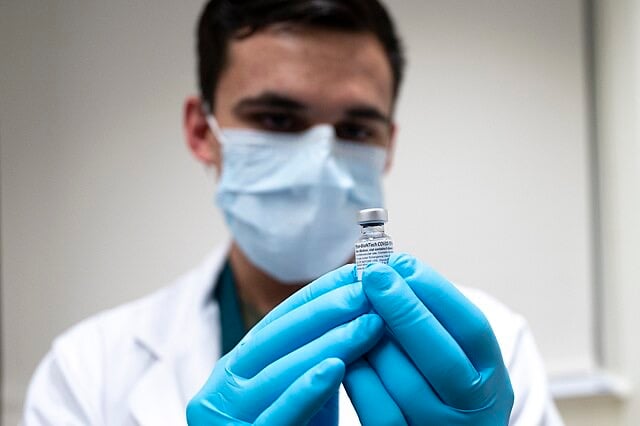Scientists in Turkey have discovered measurable changes in the corneal structure of healthy adults following Pfizer-BioNTech COVID-19 vaccination, raising questions about potential long-term effects on eye health, particularly for those with pre-existing conditions.
The peer-reviewed study, published on Wednesday in the journal Ophthalmic Epidemiology, examined 64 participants before and after receiving both doses of the vaccine, revealing an 8.4 per cent reduction in corneal endothelial cells and increased corneal thickness.
Researchers from Recep Tayyip Erdogan University and Kocaeli University used advanced imaging technology to evaluate 128 eyes over approximately 75 days, finding statistically significant changes despite no participants reporting vision problems during the study period.
Dr Fatma Sumer, lead researcher from the Department of Ophthalmology at Recep Tayyip Erdogan University Faculty of Medicine in Rize, and colleague Dr Sevgi Subasi from Kocaeli University, documented corneal thickness increasing from 528 to 542 micrometres—approximately a two per cent rise.
“Changes in corneal endothelium occur in the short term after two doses of the Pfizer-BioNTech COVID-19 mRNA vaccine,” the researchers stated in their conclusion.
The study revealed endothelial cell density dropped from an average of 2,597 to 2,378 cells per square millimetre, whilst the coefficient of variation in cell size increased from 39 to 42 per cent, indicating cellular stress. Additionally, the percentage of cells maintaining their healthy hexagonal shape decreased from 50 to 48 per cent.
Whilst these values remain within normal ranges for healthy adults, experts warned the findings could have implications for vulnerable populations. “The endothelium should be closely monitored in those with a low endothelial count or who have had a corneal graft,” the study authors cautioned.
The corneal endothelium, a single layer of cells lining the inner surface of the cornea, plays a crucial role in maintaining corneal transparency by pumping excess fluid from the tissue. Unlike many other cells in the body, endothelial cells do not regenerate, making any damage potentially permanent.
Nicolas Hulscher, an epidemiologist with the McCullough Foundation, commented on the findings: “Perhaps the most disturbing part of this study is the fact that the corneal endothelium does not regenerate. Once these cells are lost, they cannot be replaced.”
The research employed sophisticated equipment including Sirius corneal topography and Tomey EM-4000 specular microscopy to capture detailed measurements. All participants underwent comprehensive ophthalmological examinations, including visual acuity assessments, intraocular pressure measurements, and anterior segment evaluations.
These findings add to existing concerns about COVID-19 vaccine side effects. In May, the US Food and Drug Administration expanded warning labels on Pfizer and Moderna vaccines to include risks of myocarditis and pericarditis, particularly in males aged 16 to 25.
Dr Clara Chan, presenting at the 2022 ASCRS Annual Meeting, discussed several cases of corneal complications following COVID-19 vaccination, including graft rejections and herpetic keratitis flares. “We’re seeing more inflammatory corneal events,” Chan noted, though she emphasised the difficulty in proving direct causation.
The phenomenon of vaccine-induced ocular inflammation is not unprecedented. Dr Bennie Jeng explained that vaccines can potentially trigger immune reactions affecting the eyes: “It makes sense because the vaccination boosts your immune system, and your immune system gets revved up.”
For individuals with compromised corneal health, including those with previous eye surgeries, infections, or conditions like Fuchs’ dystrophy, even small changes in endothelial cell count could pose risks. Prolonged alterations might lead to corneal oedema, bullous keratopathy, or corneal decompensation—conditions that can cause permanent vision loss if untreated.
The Turkish researchers noted their study examined only short-term effects, acknowledging the need for long-term follow-up to determine whether these changes persist or worsen over time. They did not recommend against vaccination but emphasised the importance of monitoring specific populations.
Health authorities maintain that the benefits of COVID-19 vaccination continue to outweigh the risks for the majority of the population. Neither Pfizer nor regulatory bodies have issued official responses to these specific findings at the time of publication.
Ophthalmologists recommend that individuals experiencing blurry vision or eye discomfort consult a specialist. A non-invasive test using specular microscopy can assess endothelial cell health and determine if intervention is necessary.
The study’s methodology involved examining participants before their first vaccine dose and approximately 75 days after their second dose, with the research team reporting no conflicts of interest and no external funding for the project.
As COVID-19 vaccination programmes continue globally, these findings underscore the importance of ongoing research into potential side effects across all organ systems, enabling healthcare providers to make informed decisions for individual patients, particularly those with pre-existing conditions.
Follow for more updates on Britannia Daily
Image Credit:
Pfizer-BioNTech COVID-19 vaccine (2020) – Photo by Marco Verch, licensed under CC BY 2.0, via Wikimedia Commons.
View Image



